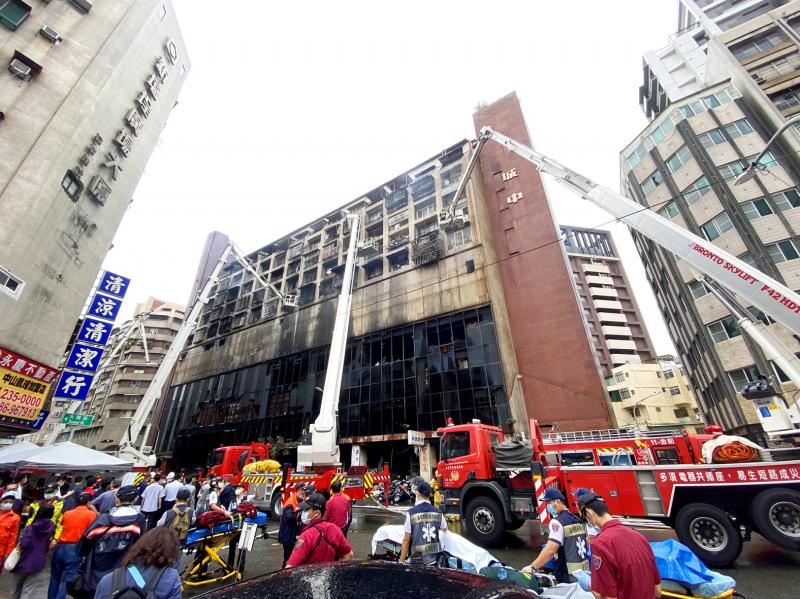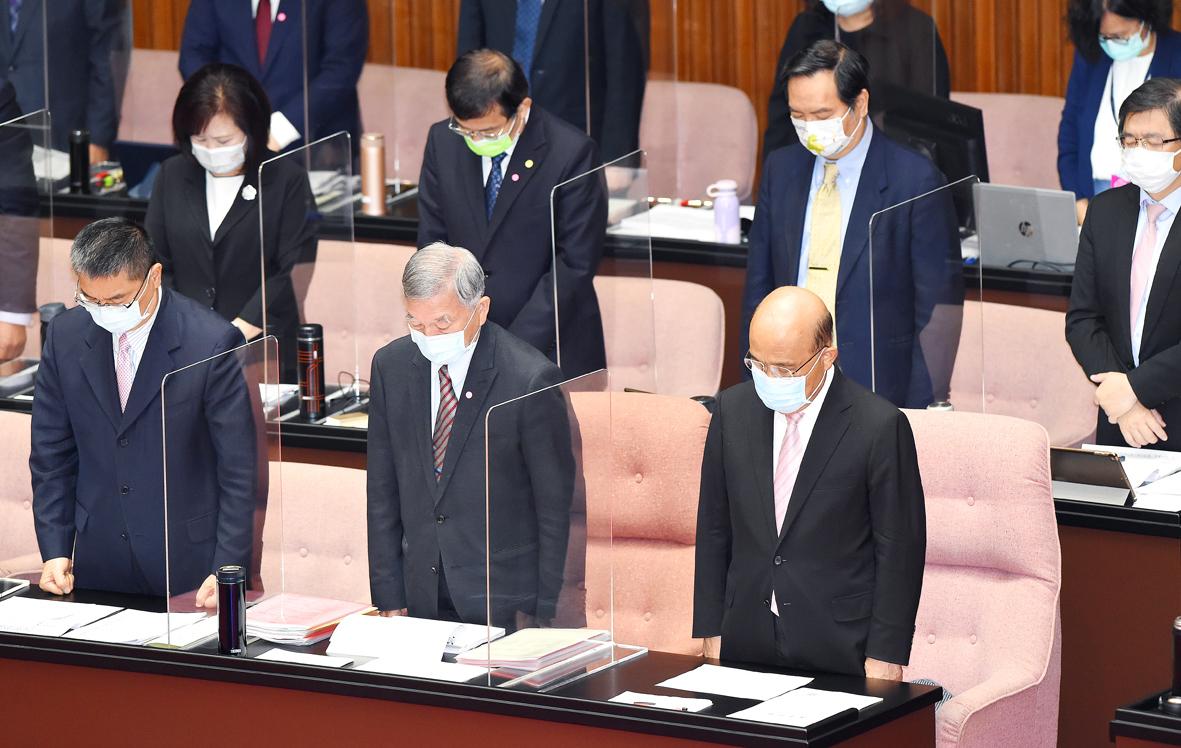The recent fire in the Cheng Chung Cheng (城中城) building in Kaohsiung that killed 46 people will no doubt be remembered for a few minutes, until the news cycle moves on to the next vehicle accident or movie star having an affair. It will likely result in the passage of new, tougher regulations, which will be enforced like all previous rounds of tougher regulations.
It will not result in change, however. Karl Marx famously remarked that “History repeats itself, first as tragedy, second as farce.” Alas, in Taiwan, repeated building fires remain tragedies, created by the farce that is our regulatory apparatus.
Anyone remember the notorious Welcome Bar (衛爾康餐廳) fire in 1995? A blaze caused by a gas leak left 64 clubbers dead, a toll second only to a coal mine fire that took 103 in 1984. The place was a model of regulatory dysfunction: the first floor had a license, but the second and third did not. Two of the three safety exits were sealed off and an illegal structure blocked the path of fire trucks. The staff fled out the one functional exit but never informed the patrons, who were trapped in a sealed exit.

Photo: Hung Chen-hung, Taipei Times
The mayor of Taichung and three other major officials were impeached. Fire safety regulations were revised. Yet, a quarter century later, here we are again, with officials performing apology kabuki and temporarily enforcing regulations in a spasm of activity, like couch potatoes who finally buy that gym membership.
In major criminal cases, the public often complains that punishments are too light. This is a problem throughout the regulatory apparatus: fines are tiny and oversight lax.
Why? Things are that way because the public likes them that way.

Photo: Liao Chen-hui, Taipei Times
LACK OF REGULATION
Years ago I participated in a massive survey of US state government industrial policies. Invariably, when state officials we interviewed found out that I had spent time in Taiwan, they asked how they could re-create the small- and medium-enterprise industrial district-based success of Taiwan in their own state.
Each time I was forced to explain: much of the success was due to the complete lack of safety, environmental, and financial regulation of small Taiwanese firms. That regulatory environment could not be replicated in the US for small firms.
So many of those in Taiwan now comfortably well-off kvetching about the behavior of others made their money the “ghost building” way — in illegal small factories, exploiting workers, cutting corners, and dumping unregulated waste hither and yon.
Hundreds of older “ghost buildings” like the Cheng Chung Cheng remain in Taiwan, where impoverished elders eke out the end of their days amidst the rubble of the economic miracle. For most of these buildings, life will go on as it always has, with regulators without authority unable to contact their myriad owners who live far away and don’t care as long as the rent is paid.
Imagine if fire regulations were enforced and illegal structures were condemned. Where would all those people go? Though Taiwan is massively overbuilt, it somehow avoided building housing for the poor, and strangely the government has failed to form a plan to convert all those empty flats into social housing. Instead, it is planning to build more flats.
The Taiwan Miracle may get the admiring press, but the real East Asian growth model is a domestic economy that functions by endlessly turning flows of gravel into unnecessary concrete structures, the bitter alchemy that transforms public subsidies into private profits. Hence, the preference for building new public housing: in Taiwan, the arc of public policy is long, but it bends towards construction-driven GDP growth.
COMMONPLACE ILLEGALITY
If Taiwan were properly regulated, the domestic political economy would scream. Knock down all the illegal rooftop structures and built-out balconies? Close illegal factories on farmland? Update the real estate assessed value? Stop permitting developers to cut projects into plots too tiny to trigger an environmental impact assessment and then renting them back to themselves to be amalgamated into a massive plot?
Heaven forfend!
It will never happen, because everyone participates and “benefits” from the lax regulation of everything. Run a red light? Odds of getting caught are nil, if you’re at least moderately intelligent. Illegal parking is rampant. Shave a chunk off the neighbor’s property? Force employees to work unpaid overtime? Annex adjacent public land? Dump your unwanted pet in the street? Easy as pie, no one will stop you.
All this commonplace illegality exists, not merely because regulations are not enforced, but because regulatory failure has an effect that is seldom remarked on: there is never enough of anything. For example, builders put up the minimum required amount of X (interior space, windows, parking places) while at the same time, occupy space that they should not. That is regulatory failure.
The result of this weirdly lax regulatory regime is that for many public goods, from parking spaces to public parks, there is an appalling lack.
The bureaucracy that specifies so much about buildings is a total regulatory failure — Taiwanese build out balconies and put up illegal rooftop structures because they do not have enough space. They store things in stairwells because homes lack space for all the things they need and want. Since the regulatory regime favors developers, locals overpay for homes that are much too small.
REGULATORY FAILURE
On the east coast I know many people attempting to build eco-friendly houses. Regulators come down hard on them. Naturally, many of those houses are a stone’s throw from illegal B&Bs.
People often point at America’s gun insanity, quite rightly saying that Americans shrug when schoolchildren are massacred just because some people like owning guns.
Yet Taiwanese are not different. But instead of slaughtering schoolchildren on the altar of toxic masculinity, we sacrifice people to the god of indifferent safety culture.
We have massive air pollution that kills via respiratory diseases, but at least our products our affordable. We have deaths because our vegetables are laced with chemicals and our meat with drugs, but at least they are cheap and pass inspection. We have many extra deaths because of illegal driving and cheaply-made vehicles, but at least people can get to where they need to go quickly and affordably.
Rene Girard argued in Violence and the Sacred that when social chaos threatens, societies resolve the problem of disorder by arbitrarily selecting an individual for sacrifice who is simultaneously the cause of the problem and the actor whose punishment can relieve it: a scapegoat.
In the Cheng Chung Cheng fire, that’s the poor woman who somehow killed 46 people with an errant mosquito coil. She will be punished and the threat of social disorder — Oh my god, what if they start sincerely enforcing regulations!? — relieved. The regulators will then be able to go right back to failing.
Because people like it that way.
Notes from Central Taiwan is a column written by long-term resident Michael Turton, who provides incisive commentary informed by three decades of living in and writing about his adoptive country. The views expressed here are his own.

Jacques Poissant’s suffering stopped the day he asked his daughter if it would be “cowardly to ask to be helped to die.” The retired Canadian insurance adviser was 93, and “was wasting away” after a long battle with prostate cancer. “He no longer had any zest for life,” Josee Poissant said. Last year her mother made the same choice at 96 when she realized she would not be getting out of hospital. She died surrounded by her children and their partners listening to the music she loved. “She was at peace. She sang until she went to sleep.” Josee Poissant remembers it as a beautiful

Before the last section of the round-the-island railway was electrified, one old blue train still chugged back and forth between Pingtung County’s Fangliao (枋寮) and Taitung (台東) stations once a day. It was so slow, was so hot (it had no air conditioning) and covered such a short distance, that the low fare still failed to attract many riders. This relic of the past was finally retired when the South Link Line was fully electrified on Dec. 23, 2020. A wave of nostalgia surrounded the termination of the Ordinary Train service, as these train carriages had been in use for decades

Lori Sepich smoked for years and sometimes skipped taking her blood pressure medicine. But she never thought she’d have a heart attack. The possibility “just wasn’t registering with me,” said the 64-year-old from Memphis, Tennessee, who suffered two of them 13 years apart. She’s far from alone. More than 60 million women in the US live with cardiovascular disease, which includes heart disease as well as stroke, heart failure and atrial fibrillation. And despite the myth that heart attacks mostly strike men, women are vulnerable too. Overall in the US, 1 in 5 women dies of cardiovascular disease each year, 37,000 of them

Politically charged thriller One Battle After Another won six prizes, including best picture, at the British Academy Film Awards on Sunday, building momentum ahead of Hollywood’s Academy Awards next month. Blues-steeped vampire epic Sinners and gothic horror story Frankenstein won three awards each, while Shakespearean family tragedy Hamnet won two including best British film. One Battle After Another, Paul Thomas Anderson’s explosive film about a group of revolutionaries in chaotic conflict with the state, won awards for directing, adapted screenplay, cinematography and editing, as well as for Sean Penn’s supporting performance as an obsessed military officer. “This is very overwhelming and wonderful,” Anderson